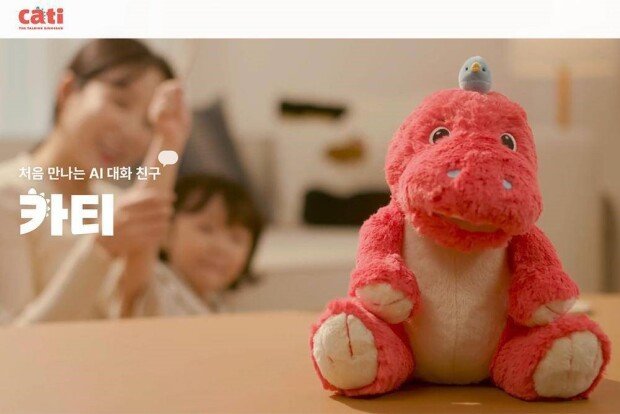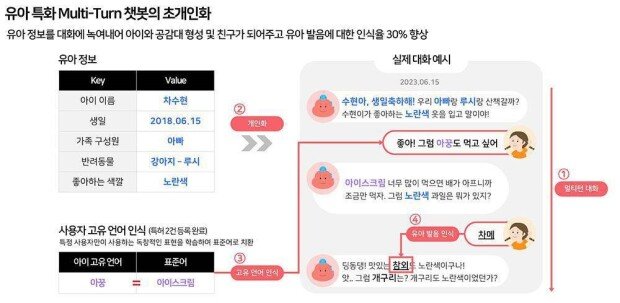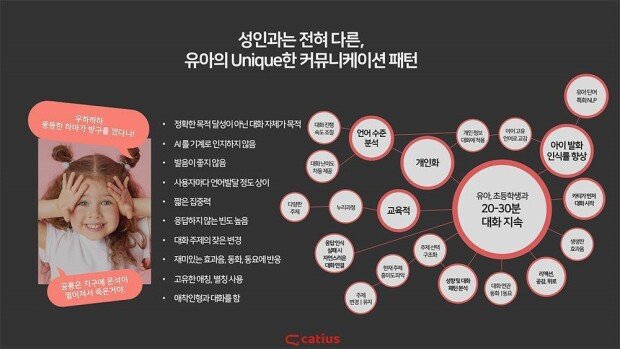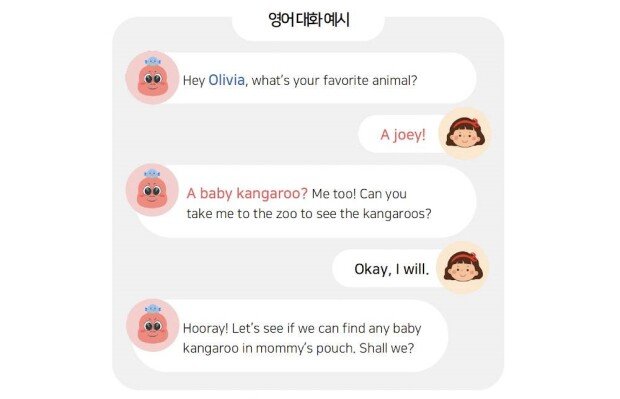Catius: "AI Technology Tailored to Children's Language Development Contributes to Language Learning"
Catius: "AI Technology Tailored to Children's Language Development Contributes to Language Learning"
Posted December. 23, 2024 15:29,
Updated December. 23, 2024 15:29
Frequent communication between parents and children is the most crucial factor in developing a child’s language skills. By having these conversations, children begin to enhance their language abilities, building the foundation for linguistic thinking through reciprocal interactions. Research on the effect of the COVID-19 shutdowns has shown that children’s language skills declined due to a lack of communication, highlighting the importance of this interaction.
Meanwhile, conversational AI has gained significant attention with the rise of ChatGPT. AI-powered English conversation tools have become mainstream in the language education market, and conversational AI is increasingly being used in chatbots and call centers. What if conversational AI could engage with children using language tailored to their developmental level, aiding in their language growth? This idea is where Catius began.
The World's First Conversational AI Technology for Young Children, by Catius
 Catius develops technologies and manufactures products like "Cati," an interactive AI for young children / Source: Catius
Catius develops technologies and manufactures products like "Cati," an interactive AI for young children / Source: Catius
Starting as an in-house venture at Samsung SDS, Catius was established in January 2020. The company developed a proprietary conversational AI engine that reflects young children's speech patterns and language development characteristics. This AI provides conversations that are tailored to the cognitive abilities and language levels of children ages 2 to 5, helping enhance their language and thinking skills.
Rather than taking an adult-oriented AI and adapting it, Catius built its AI specifically for the unique conversational patterns of young children. The company identifies these characteristics as: ▲ conversations for the sake of talking ▲ children not perceiving AI as a machine ▲ imprecise pronunciation ▲ varied language development levels among children ▲ short attention spans ▲ sensitivity to auditory stimuli like sound effects, fairy tales, and songs ▲ frequent topic changes ▲ unique individual language usage. Using these insights, Catius creates a personalized AI for each child.
 Unlike general conversational AI, it is designed to keep children engaged in conversations / Source: Catius
Unlike general conversational AI, it is designed to keep children engaged in conversations / Source: Catius
A key feature of Catius’s technology is its ability to recognize and understand young children's unique pronunciation patterns, distinguishing it from adult-oriented AI. Children often replace standard words with their unique expressions or use incorrect pronunciations. For example, they may say “ahkoong” for “ice cream,” or “habi” for “grandfather.” This AI engine accurately interprets a child’s intent based on context and conversational patterns, translating it into standard language for natural responses. For instance, when a child says, “I want ahkoong,” the AI might respond, “You can have a little ice cream.”
This technology combines deep learning-based voice modeling and natural language processing (NLP) for contextual understanding. By analyzing speech patterns and semantic networks, the system facilitates meaningful conversations in real time. Beyond correcting pronunciation, it respects children’s creative expressions and provides an enriched communication experience.
Conversational AI for Young Children: "Cati" is Designed for Their Level
To make conversational AI approachable for children, Catius has developed "Cati," which combines a plush toy exterior with internal hardware for operation. The internal device supports the Korean language by default and is piloting English ahead of its official launch. The device connects to a parent’s mobile app, which parents can use to play content through Cati and suggest topics for conversation. The app also adjusts the pace of dialogue to match the child’s response speed.
The conversational content aligns with educational standards, covering topics like nature, animals, transportation, role-playing, quizzes, daily habits, and safety education. It also includes interactive storytelling, in which children can draw with the AI, participate in conversations, and solve quizzes while creating stories together.
 Children’s conversational patterns differ from those of adults. Catius's AI focuses on these distinctions in its design. / Source: Catius
Children’s conversational patterns differ from those of adults. Catius's AI focuses on these distinctions in its design. / Source: Catius
Cati also features an avatar talk function, allowing parents to communicate messages to their children via the toy. It offers 20 types of stories, songs, and lullabies. Through conversations with the child, Cati collects and analyzes personalized data, including names, family details, interests, and educational institutions attended, as well as language development metrics like vocabulary size, sentence length, and grammar usage. These insights are compiled into language development reports for parents.
Unlimited Conversations and Competitive Pricing Expand the Market
The product’s competitiveness is notable. According to research by Ewha Womans University’s Language Development Research Institute, children using Cati demonstrated three times higher comprehension of stories compared to those who did not. Unlike adult-oriented AI, which provides simple responses, Cati encourages children’s engagement through multi-turn conversations. While many competing products use pre-recorded or limited dialogues, Cati generates unlimited conversations using safe and educational words and sentences tailored to the selected topic.
 With SBA’s support, Catius is collaborating with Lotte World’s character IP and dedicated stores while expanding overseas / Source: Catius
With SBA’s support, Catius is collaborating with Lotte World’s character IP and dedicated stores while expanding overseas / Source: Catius
Recognizing Catius’s market competitiveness and potential, the Seoul Business Agency (SBA) has been actively supporting the company. In February of this year, Catius was selected for Seoul’s caregiving robot testbed program, developing and testing services for individuals with developmental disabilities in Songpa-gu. The company also participated in the 2024 Try Everything Unicorn Challenge IR sessions, winning a commendation from the Mayor of Seoul. These achievements enabled Catius to receive global commercialization grants and follow-up funding.
In addition, through SBA’s collaboration with Hotel Lotte and Lotte World, Catius participated in the “2024 Lifestyle Hardware Startup Accelerating” program, at which it received expert roundtable consultations, distribution advice, networking opportunities, and IR feedback. Through this initiative, Catius launched “AI Lorry Cati” in partnership with Lotte World’s IP. By adding support for English, Catius is targeting expansion in the U.S. and Singapore, and is aiming to secure users in more than 20 countries, including Australia, Japan, and some of the European countries.
 Catius's conversational AI for children is well-suited for overseas expansion with its English support / Source: Catius
Catius's conversational AI for children is well-suited for overseas expansion with its English support / Source: Catius
According to Business Research Insights, the global early childhood education market had a size of $258.9 billion (approximately 371.5 trillion KRW) in 2023 and is expected to grow at an annual rate of 8.43%, reaching $536.3 billion (approximately 769.53 trillion KRW) by 2032. This growth is driven by the increased adoption of digital education post-COVID-19, the introduction of government policies to promote high-quality e-learning, and advanced educational technologies for cognitive skill development. Cati, a product designed to meet this market demand, is why Catius’s future looks even brighter.
by Si-hyeon Nam (sh@itdonga.com)
Meanwhile, conversational AI has gained significant attention with the rise of ChatGPT. AI-powered English conversation tools have become mainstream in the language education market, and conversational AI is increasingly being used in chatbots and call centers. What if conversational AI could engage with children using language tailored to their developmental level, aiding in their language growth? This idea is where Catius began.
The World's First Conversational AI Technology for Young Children, by Catius

Starting as an in-house venture at Samsung SDS, Catius was established in January 2020. The company developed a proprietary conversational AI engine that reflects young children's speech patterns and language development characteristics. This AI provides conversations that are tailored to the cognitive abilities and language levels of children ages 2 to 5, helping enhance their language and thinking skills.
Rather than taking an adult-oriented AI and adapting it, Catius built its AI specifically for the unique conversational patterns of young children. The company identifies these characteristics as: ▲ conversations for the sake of talking ▲ children not perceiving AI as a machine ▲ imprecise pronunciation ▲ varied language development levels among children ▲ short attention spans ▲ sensitivity to auditory stimuli like sound effects, fairy tales, and songs ▲ frequent topic changes ▲ unique individual language usage. Using these insights, Catius creates a personalized AI for each child.

A key feature of Catius’s technology is its ability to recognize and understand young children's unique pronunciation patterns, distinguishing it from adult-oriented AI. Children often replace standard words with their unique expressions or use incorrect pronunciations. For example, they may say “ahkoong” for “ice cream,” or “habi” for “grandfather.” This AI engine accurately interprets a child’s intent based on context and conversational patterns, translating it into standard language for natural responses. For instance, when a child says, “I want ahkoong,” the AI might respond, “You can have a little ice cream.”
This technology combines deep learning-based voice modeling and natural language processing (NLP) for contextual understanding. By analyzing speech patterns and semantic networks, the system facilitates meaningful conversations in real time. Beyond correcting pronunciation, it respects children’s creative expressions and provides an enriched communication experience.
Conversational AI for Young Children: "Cati" is Designed for Their Level
To make conversational AI approachable for children, Catius has developed "Cati," which combines a plush toy exterior with internal hardware for operation. The internal device supports the Korean language by default and is piloting English ahead of its official launch. The device connects to a parent’s mobile app, which parents can use to play content through Cati and suggest topics for conversation. The app also adjusts the pace of dialogue to match the child’s response speed.
The conversational content aligns with educational standards, covering topics like nature, animals, transportation, role-playing, quizzes, daily habits, and safety education. It also includes interactive storytelling, in which children can draw with the AI, participate in conversations, and solve quizzes while creating stories together.

Cati also features an avatar talk function, allowing parents to communicate messages to their children via the toy. It offers 20 types of stories, songs, and lullabies. Through conversations with the child, Cati collects and analyzes personalized data, including names, family details, interests, and educational institutions attended, as well as language development metrics like vocabulary size, sentence length, and grammar usage. These insights are compiled into language development reports for parents.
Unlimited Conversations and Competitive Pricing Expand the Market
The product’s competitiveness is notable. According to research by Ewha Womans University’s Language Development Research Institute, children using Cati demonstrated three times higher comprehension of stories compared to those who did not. Unlike adult-oriented AI, which provides simple responses, Cati encourages children’s engagement through multi-turn conversations. While many competing products use pre-recorded or limited dialogues, Cati generates unlimited conversations using safe and educational words and sentences tailored to the selected topic.

Recognizing Catius’s market competitiveness and potential, the Seoul Business Agency (SBA) has been actively supporting the company. In February of this year, Catius was selected for Seoul’s caregiving robot testbed program, developing and testing services for individuals with developmental disabilities in Songpa-gu. The company also participated in the 2024 Try Everything Unicorn Challenge IR sessions, winning a commendation from the Mayor of Seoul. These achievements enabled Catius to receive global commercialization grants and follow-up funding.
In addition, through SBA’s collaboration with Hotel Lotte and Lotte World, Catius participated in the “2024 Lifestyle Hardware Startup Accelerating” program, at which it received expert roundtable consultations, distribution advice, networking opportunities, and IR feedback. Through this initiative, Catius launched “AI Lorry Cati” in partnership with Lotte World’s IP. By adding support for English, Catius is targeting expansion in the U.S. and Singapore, and is aiming to secure users in more than 20 countries, including Australia, Japan, and some of the European countries.

According to Business Research Insights, the global early childhood education market had a size of $258.9 billion (approximately 371.5 trillion KRW) in 2023 and is expected to grow at an annual rate of 8.43%, reaching $536.3 billion (approximately 769.53 trillion KRW) by 2032. This growth is driven by the increased adoption of digital education post-COVID-19, the introduction of government policies to promote high-quality e-learning, and advanced educational technologies for cognitive skill development. Cati, a product designed to meet this market demand, is why Catius’s future looks even brighter.
by Si-hyeon Nam (sh@itdonga.com)
Headline News
- Conflict mounts over removing rebellion crime from impeachment bill
- 55 percent of Seocho apartment transactions in October involved property gifting
- Richer people live up to nine more healthy lives
- Zelenskyy claims N. Korean troops lost heavy casualties in Kursk
- Man City secures 2 consecutive wins with Haaland leading the charge







